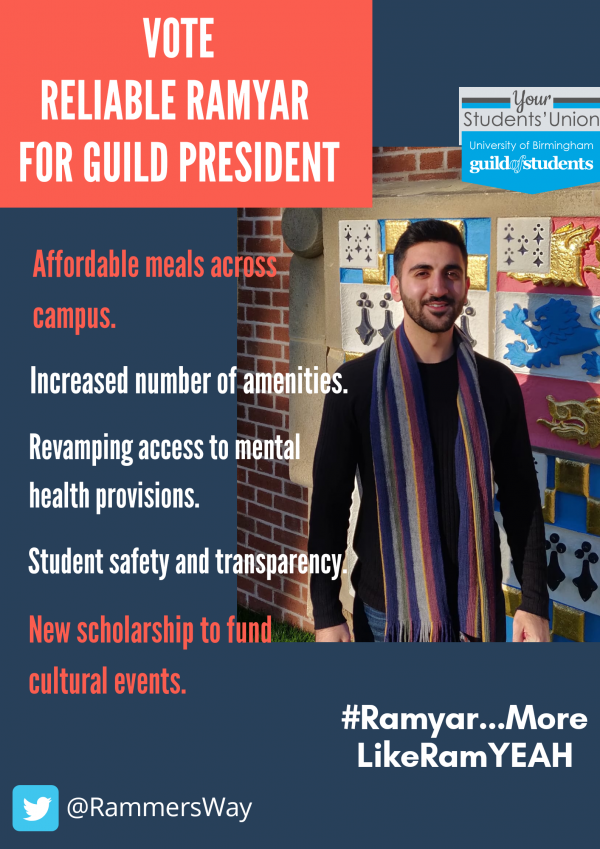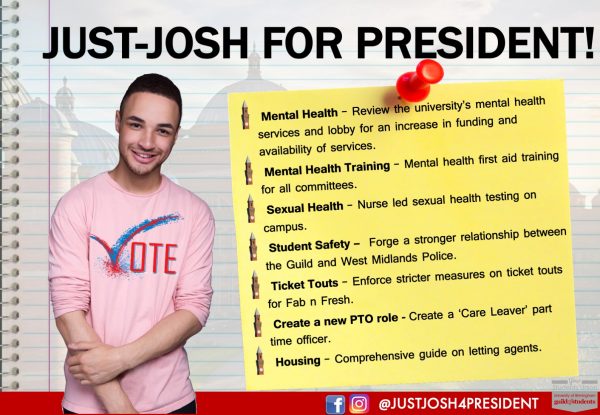
In the run-up to their campaigns going live, Elections Editor Tom Leaman interviewed this year’s Guild President candidates to learn more about their manifestos
The Guild President leads the student union’s officer team and represents the University’s student body.
The candidates running for the position this year are listed alphabetically by their surname on this page. Voting for Guild Elections opens at 10 AM on Monday 25th February and closes at 4 PM on Friday 1st March, with the results announced on Saturday 2nd March. Vote HERE.
Ramyar Ahmed

Second-year student ‘Reliable Ramyar’ Ahmed says he has two main policies in his campaign to become the next Guild President. ‘My selling point number one would be affordable meals across campus,’ begins Ahmed, stating that ‘there aren’t many nice affordable meals’ available for students.
The second key manifesto point for Ahmed is a scholarship to fund cultural events on campus. He gives the examples of the Christmas funfair and Valefest as examples of large-scale social events that are already held at UoB, but Ramyar has a vision where ‘any individual or society can ask for funding to put on a social event on a big scale.’
He believes that this scheme can emulate the spirit of the 2022 Commonwealth Games, which he says will be ‘a celebration of cultures and identity, and hopefully, we can really ignite that within our campus.’ He says that the proposed scheme, which would reflect the diversity of UoB’s student body, could fund ‘any suitable and feasible’ event.
Regarding the funding for the scheme, he tells Redbrick: ‘I think that’s not really difficult. We can get donations from alumni or even students can fund it ourselves – selling Krispy Kremes is always really good.’
He also suggests that money could be donated from ‘the local council, as it could be a partnership with the Commonwealth Games. If we can show the evidence that it will have a positive effect on the local community, I’m sure the local council would like to get involved too.’
If we can show the evidence that it will have a positive effect on the local community, I’m sure the local council would like to get involved too
Ramyar’s manifesto also shows his desire to revamp how students access the University’s mental health provisions. He says that some of the University’s self-help guides, which he has used himself, ‘are really good’ but are too difficult to access: ‘I’m not too sure if many students know they exist or where they can find them.’ He says that improving the layout of the University’s website or app could be beneficial.
On the subject of student safety, Ahmed praises the ‘great achievement’ of Reece Patrick Roberts’ Selly Express service, saying ‘hopefully, we’ll continue that.’ He would also ensure that the University is held accountable to the promises it makes regarding this issue. ‘From my understanding, I don’t think there’s a safety committee, so that could be a potential committee we can set up and if anyone has any issues they can come to them.’
Ahmed is the current secretary of the Commuter Society, a committee member for diversity and inclusion within the POLSIS department, and a Guild of Students NUS delegate. He believes these experiences would make him ‘a very open’ leader who ‘is a good listener’ and ‘will accept views that are different to mine.’
He ended his interview by affirming that students are ‘so powerful’ and, if he was elected Guild President, he would ‘engage with students more and ‘make sure their views are represented.’
Svenja Peters

‘I was actually inspired by a Brumfess post’ about ‘what the Uni’s getting away with,’ first-year Psychology student Svenja Peters tells Redbrick when describing her motivations to run for Guild President. While Peters admits that she has had limited opportunities to climb the hierarchy of societies as a first-year, she has confidence in her ‘slightly more radical approach’ to getting the University to act on the wishes and needs of students.
Peters believes that the biggest issue currently affecting students at the University of Birmingham is access to mental health services. She says that provisions currently in place, such as Guild Advice, need to be both better publicised to students and expanded to ensure that students get the support that they need. One issue she perceives is that some students do not know how to access the services that are currently in place to be able to get ‘discreet’ and ‘safe’ mental health support. By better-informing students of the services that are available and expanding them to include more professionals, Peters believes the University will be better equipped to provide support for students ‘whenever they need it.’
I think the general issue is that the University doesn’t spend the money where it should be
When discussing Selly Oak, Peters admits that she is ‘a bit nervous’ about moving into the area when she starts her second year of study. She says that the high volume of posts on the Facebook page ‘Fab N Fresh’ is a factor in this, as it shows a variety of different types of crimes happening close to the University on a regular basis. Regarding improving the situation, Peters believes that the University could do more to fund student safety, saying: ‘I think the general issue is that the University doesn’t spend the money where it should be, but on what they think is more important, like advertising and aesthetics.’
Peters again raises the idea of promoting schemes that are currently in place, such as street patrols. Peters also told Redbrick that she wants to ensure that the Selly Express continues to be funded into the future.
Peters also wants funding to be ‘redistributed’ by the University to ensure that accommodation is affordable for all first-year students. To do this, she says that she would ask the University for a breakdown of how tuition fees get spent, so that she can show students where the money could be reallocated. She also told Redbrick that she is considering attempting to introduce a reduced fee for students from a lower-income background to make costs ‘less of a barrier’ for prospective students.
Peters pledges to improve the WiFi networks in the library, as she says it is ‘very frustrating’ for students trying to do research when the WiFi is faulty, particularly for students writing their dissertations. She said: ‘I think that’s one of the easiest things to get fixed, to just get better access to WiFi in the library on all floors.’
Joshua Williams

Lifelong Birmingham resident Joshua Williams makes it clear that his experience working in mental health ensures that his welfare-related manifesto points are more than just a ‘token element.’
He suggests that there are three main issues facing the University’s mental health policies: funding, accessibility, and follow-up support. While he says that the University generally scores well in league tables regarding mental health funding, he believes that ‘there is more that we can do’, such as ensuring that no students have to wait more than 10 weeks to access counselling services.
Summarising his mental health policies, Williams tells Redbrick: ‘I want people to know this is something I’m deeply passionate about. I want to enact a lasting change for all students that speak out and say “I’m not ok.”’
Another of Josh’s manifesto points is introducing nurse-led sexual health testing to campus, which he says is ‘vital’ to ensure that students can get professional help on campus as an alternative to using sexual health testing kits provided by charities such as Umbrella, which he says students may find uncomfortable or embarrassing.
I may be running for President, but that doesn’t make me more important than the Welfare Officer or than the LGBT Officer
Another manifesto point of Williams is to introduce a Care Leaver Part-Time Officer role, as he says that students who have come to University from the care of a local authority have high drop-out rates.
‘The whole point of part-time officers is to represent under-represented groups on campus and make sure everybody has a voice.’ He says this role would ensure that ‘people like me can look at the Guild and see themselves represented and know that they have a place to turn to for support for specific issues related to being in the care of a local authority.’
Moving onto the topic of student safety, ‘Just Josh’ says that the ‘vulnerable’ student-dominated population of Selly Oak means that forging and maintaining a strong relationship with West Midlands Police is an important target.
One factor in this is ‘promoting services such as the Blue Line scheme, where the University has trained five students to become special constables.’ He believes that publicising such schemes could be important in helping the student body feel safer in Selly Oak.
Finally, another Selly Oak policy proposed by Williams is ‘a comprehensive guide on lettings agents in Selly Oak’ which he sees as something ‘that can be done over a short period of time.’ If elected, this system would compile students’ experiences of housing and lettings agents operating in the area.
As President, Williams would ‘ensure inclusivity and accountability,’ saying that the officer team is such a success because it’s made up of a diverse group of people who come together ‘to fight for the common cause’ of improving the student experience at UoB.
‘Yes, I may be running for President, but that doesn’t make me more important than the Welfare Officer or than the LGBT Officer.’ Reflecting on his decision to run, Williams told Redbrick: ‘I think it’s important to stand up for what you believe in.’
Le’Shaé Woodstock
 ‘I’m a leader, but I really value the people around me,’ says Psychology student Le’Shaé Woodstock, who also works as a Black Student Experience Researcher at the Guild. Under her leadership, Woodstock would aim to implement a Fab card, which would follow the example of other students unions in giving students ‘unlimited access to Fab and Sports Night’ as well as a drinks discount at Joe’s for a yearly fee.
‘I’m a leader, but I really value the people around me,’ says Psychology student Le’Shaé Woodstock, who also works as a Black Student Experience Researcher at the Guild. Under her leadership, Woodstock would aim to implement a Fab card, which would follow the example of other students unions in giving students ‘unlimited access to Fab and Sports Night’ as well as a drinks discount at Joe’s for a yearly fee.
Another of Woodstock’s key manifesto points is to extend the Selly Express service so it also serves students living in Harborne, Selly Park and Edgbaston. To get the University to commit to funding the scheme, Woodstock says that meetings with the University’s senior management team, including the Vice-Chancellor, could be beneficial to explain that ‘safety is the top priority.’ Extending the Selly Express is something that she says would be especially useful to students who live outside of Selly Oak, giving the example of medical students who live in Harborne to be closer to the Medical Centre.
In lectures, Le’Shaé has often felt ‘extremely uncomfortable’ after hearing culturally insensitive or disrespectful comments from lecturers, and she views cultural awareness training for members of staff within both the Guild and the University as a way to protect minority students. For Woodstock, the root of this issue seems to be a lack of exposure to diversity and cultural education for staff, as she told Redbrick: ‘I believe education is the key to helping cultural awareness – if you’re not brought up in a way to be aware of other cultures, you’re not going to know.’
My main motivation is to help students have a positive experience, no matter where they’ve come from
Another of Woodstock’s campus-based manifesto points is to ensure that the Green Heart is utilised during the Spring and Summer, such as for live music and an outdoor cinema. Woodstock told Redbrick that she did not support the development of the site, calling it ‘a huge space that could have been utilised for something else,’ but has since adopted a ‘now it’s here, let’s use it’ attitude. These events on the Green Heart, particularly in the run-up to exam season, would offer students a way to relieve stress and spend time with friends, making this an important point for her.
To improve and modernise the ‘old-fashioned’ process of finding housing in Selly Oak, Woodstock proposes a Guild Lettings app, which would allow students to review their landlords. To get a lot of reviews on the app quickly, she would incentivise downloading the app and reviewing landlords, such as by offering £1 Domino’s Pizza.
Finally, Woodstock discussed her Guild trips and activities manifesto point, which would be aimed especially at international students to help them integrate into the University community. If elected, Woodstock would introduce day trips to key Birmingham and West Midlands attractions such as Cadbury World, the Sea Life Centre and Stratford-upon-Avon. Woodstock concluded her interview with Redbrick by saying: ‘My main motivation is to help students have a positive experience, no matter where they’ve come from.’
Another candidate for the role, Michael Stephens (running as Mr 2 Ply), did not respond to Redbrick’s offer of an interview.


Comments